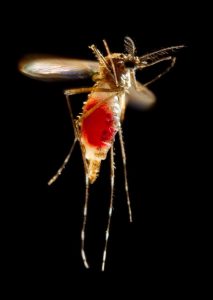iSEE Critical Conversation 2019:
Genetically Modified Mosquitoes
May 23-24, 2019, University Club, Chicago
 iSEE brought together academic, industry, government, and nongovernment experts to discuss biological advances and challenges in implementation and regulation of genetically modified mosquitoes for disease control — an emerging environmental, human health, and regulatory concern.
iSEE brought together academic, industry, government, and nongovernment experts to discuss biological advances and challenges in implementation and regulation of genetically modified mosquitoes for disease control — an emerging environmental, human health, and regulatory concern.
Critical Conversations are supported by a generous gift from the Alvin H. Baum Family Fund, iSEE’s founding benefactor. The Baum Fund is administered by Joel Friedman.
Read iSEE’s notes on the event >>>
On June 3, 2020, organizers and participants published an op-ed piece on GM mosquitoes in The Conversation. Read the summary >>> See the full article in The Conversation >>>
KEYNOTE: The Critical Conversation began with a public keynote the evening of May 23 by University of Illinois Entomology Professor and Head May Berenbaum, world-renowned entomologist for her research on the chemical interactions between herbivorous insects and their host-plants. Berenbaum is current Editor-in-Chief of the Proceedings of the National Academy of Sciences (PNAS), former President of the Entomological Society of America, and 2014 National Medal of Science winner.
Watch the Keynote
Berenbaum wove attendees through the tumultuous cultural and scientific history of mosquitos and genetic modification in America.
WORKSHOP: Invited participants attended a daylong workshop May 24 to tackle the myriad issues around GMM technology. In the hopes of furthering discussion toward developing a cohesive and exact regulatory framework, organizers invited experts from around, including academics, leaders from nonprofit organizations and industry, and federal scientists and regulators.
Some of the panelists:
- Mark Benedict, Research Biologist, Centers for Disease Control and Prevention
- Christophe Boëte, Research Scientist, Institut des Sciences de l’Evolution (ISEM), Université de Montpellier
- Andrew Hammond, Sir Henry Wellcome Postdoctoral Fellow, Imperial College London
- Steven Juliano, Professor of Ecology, Illinois State University
- Natalie Kofler, Founder and Director, Editing Nature
- Ana Kormos, Community Engagement Specialist, University of California at Irvine Malaria Initiative
-
Jennifer Kuzma, Director, Genetic Engineering and Society Center, North Carolina State University
-
John Leventhal, Justice, Supreme Court of the State of New York (Appellate Division, Second Department)
-
Karen Tountas, Scientific Program Manager, Foundation for the National Institutes of Health Inc.
The conversation followed Chatham House rules with no attribution of the discussion to any individual. Discussions centered on three questions for our invited participants:
- What are the public health, ethical, and cultural considerations for the use of genetically modified mosquitoes (GMMs) for disease control?
- What are the obstacles to long-term success in the use of GMMs for disease control?
- What are possible regulatory and other strategies to overcome these obstacles while accounting for the diversity of GMM technologies and for ethical and environmental concerns?
iSEE organized the 2019 Critical Conversation along with Brian Allan, Associate Professor of Entomology; Holly Tuten, Vector Ecologist at the Illinois Natural History Survey (INHS); and Chris Stone, Medical Entomologist at INHS.
Background
In late November 2018, the United Nations rejected a temporary ban on the use of gene-driven technology, but highlighted the need for case-by-case risk assessments and consultation of affected communities. This stop-gap decision reflects the current state of progress wherein ethical and philosophical frameworks for responsible (research) innovation, capacity to analyze the risks of innovation, and development of effective and proper regulations, have not kept pace with stunning leaps forward in technology.
The use of living modified organisms for agricultural pest control and human disease prevention is a subject fraught with concerns over appropriate use of technology, adequate risk analysis, and science communication. In the United States and Africa, recent controversies over the release of genetically-modified mosquitoes (GMMs) have underscored the reality that we lack a cohesive global framework for assessing biological and social risks associated with GMMs and adequately regulating their development and use.
The goal of this multi-stakeholder Critical Conversation was to develop a collaborative network and a research agenda geared toward finding actionable solutions. This event was designed as a first step in understanding the issues. Rather than formal presentations, it featured a facilitated discussion to better expose and understand the breadth and complexity of perspectives on the topic. Organizers plan to develop a high-profile publication that outlines the diversity of participants’ thoughts and a collaborative vision for a structured research program. The Institute will also leverage new seed funding for innovative research projects that can deliver regional solutions.